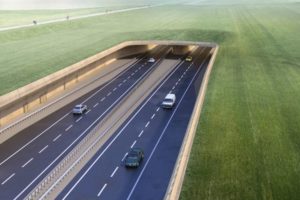
The Labour party’s policy document, Getting Britain Moving – Labour’s plan to fix Britain’s railways, says much about improving the experience of today’s passengers – ‘unified and simplified governance structure that places passengers at the heart of the goal, objectives and incentives for the railway’; and its easy route to renationalisation – ‘to bring train operators under public ownership and control’ as current contracts expire.
But little, as we have come to expect, on the things that will involve spending – putting on more trains, enhancing existing lines and building new ones. All we have is the predictable politician’s aspiration: ‘It [the plan] can usher in a decade of growth, innovation and service improvement, with the railways playing their part in Britain’s national renewal.’
So, on the face of it, little to suggest a significant shift in emphasis from the road-building championed by the present government, to an enhancement and expansion of the rail network to reduce road traffic and CO2 emissions.
Few cases demonstrate an opportunity to improve rail links over building a new road as clearly as the proposed A303 bypass at Stonehenge. The cost of a tunnel under the UNESCO world heritage site (WHS), and dual carriageway leading from it, well within the borders of the WHS, started at £1.7 bn. It is now put at £3 bn by campaigners, whose figure is not being seriously contradicted.
Once again Labour’s document is strong on aspiration. ‘Labour will set targets for modal shift to lower emissions from the transport sector. Making public transport a more reliable and attractive choice can result in huge reductions in emissions.’ It adds: ‘It has also been estimated that if drivers could be persuaded to switch just one 30-mile car journey a month to rail, then total emissions from all cars could be reduced by 6.25%.’
But it holds back on any firm commitment to initiate or fund improvements or new infrastructure; instead it offloads that duty to Great British Railways, the ‘arm’s length body and “directing mind” of empowered rail industry experts and professionals’ which it will create.
The document goes on: ‘Within the clear strategic direction set by the Secretary of State, Great British Railways will be responsible for planning timetables, improving services, and the operation, maintenance, and improvement of rail infrastructure.’ So the phrase ‘improvement of rail infrastructure’ is there. But how focused will the new ‘directing mind’ of GBR be on proposing radical infrastructure plans designed to make a specific railway line a sufficiently attractive alternative to a nearby road heading in the same direction?
 The A303 scheme, already approved by the Secretary of State for Transport, is currently on hold, pending a possible legal challenge. Throughout the planning process there has been little regard for the existing Waterloo to Exeter railway, via Salisbury, which runs close by, and takes roughly the same general path as the A303, London to Exeter. This Victorian line is single track for much of its length, served by slowish diesel trains. It cries out for investment.
The A303 scheme, already approved by the Secretary of State for Transport, is currently on hold, pending a possible legal challenge. Throughout the planning process there has been little regard for the existing Waterloo to Exeter railway, via Salisbury, which runs close by, and takes roughly the same general path as the A303, London to Exeter. This Victorian line is single track for much of its length, served by slowish diesel trains. It cries out for investment.
But there’s another line to the west, from Paddington via Reading to Exeter. The fastest trains on this line beat the swiftest car to Exeter hollow, and the line isn’t even electrified all the way. Electrification from London was halted at Newbury because of the cost. More frequent, and even faster trains on both of these lines would certainly help meet Labour’s goal of ‘modal shift to lower emissions from the transport sector’.
Labour has been largely silent on the costly, controversial Stonehenge scheme, and any intervention may be academic anyway, if the legal challenge fails and work begins well ahead of the general election. Too late for an enlightened public transport choice, where real alternatives are properly funded and actively promoted over a shiny new road, with its woeful environmental case.
But if scrapping a major new road, so far advanced in the planning process, in favour of public transport, is seen as too risky and potentially motorist-annoying for an incoming Labour government, it need look no further South Wales, where just that has already happened. There the £1.7 bn M4 bypass at Newport was scrapped in favour of public transport initiatives, by… the Labour-run Welsh government.
